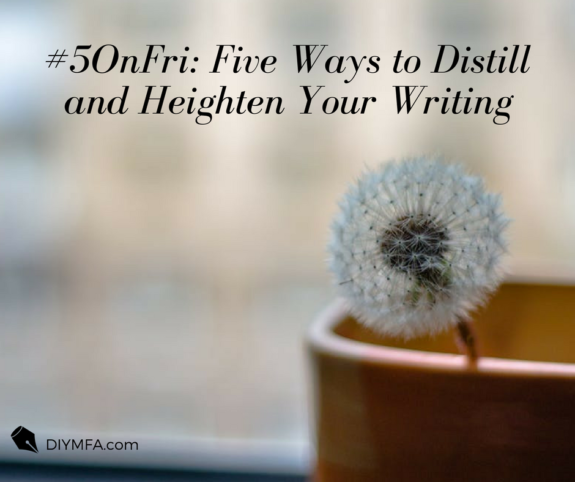What’s the trick to great writing? Making all of it great. Take out slow, confusing or tangential parts. Better, don’t even pen them in the first place. Learn to distinguish. All your words should gleam and hang together, like so many parts make a classic car or a Ferrari. All writers are told to cut – “murder your darlings” — as the famous quote goes. Editing is the key to great writing, many say. The key to editing is to distill and heighten your content to pack in information, meaning and creativity.
You can edit on paper, first getting it all out and then sifting through for the nuggets to keep. But editing can also be done in your head, using some logic, some common sense and a huge dose of creativity. Whether you are working on draft material or devising a story in your mind, keep these thoughts in mind.
1) Think of a biography
A biography (or autobiography) is a life story. Clearly, you can’t pack in every detail of a lived life in a volume that fits on a normal bookshelf. Authors have to be highly selective in what they include, distilling constantly.
What to include? Clearly, the most interesting, exciting and meaningful parts of the much longer life story. This is the most exaggerated example of distillation. Think of a non-alcoholic beer versus a shot of vodka you can set on fire.
Second, biographies are written only about the most unusual of lives – heroes, survivors, the super-rich, super talented, or otherwise larger-than-life.
Moreover, a well-written biography is not just a list of facts, it’s a true story. All the ideas form a single, tightly woven rope pulling the reader through the book from opening words to the last page.
2) Think of a memoir
Okay, now we are talking about only one slice of a life, a further distillation. A person can write more than one memoir, like the wonderful Stephen Fry, because a memoir is about one event or phase in a life. Now, the content is even more distilled and purposefully interwoven into a theme. While a biography tells you ‘everything about a person’ and the reasons they are who they are, a memoir has an even more specific takeaway message.
A memoir is meant to instruct in some way – by good or bad example. A life well-lived or a life best steered clear of if at all possible. A famous opera singer or a drug addict. The point is, the whole story revolves around a single idea – a rise to fame, redemption, overcoming impossible odds, inventing a game changer, like the light bulb, the Polio vaccine or Facebook.
3) Think of fiction
In fiction, the sky is the limit because everything can be made up. So, make up the good stuff, and pack it in. Consciously skip the bland stuff. This should be obvious but sometimes it takes practice.
Don’t talk about meals, or showers, or walks to the mail box unless it’s critical to the plot. If you do put in a dinner scene, it should have a justifiably deeper meaning – like you poisoned your hero or fed him magic beans.
Why have a common scenario in the background when you could big it up? Instead of a fallback dinner scene for ‘an important talk’, why not put your characters on a roller coaster ride, or bungee jumping or talking at the exact moment your heroine finds out there really is a monster under the bed? In general, skip past any ‘everyday things’ and the reader will fill in the obvious missing bit, no problem, and thank you for it.
4) Heighten
Once you are sure everything has a place in your story, you can focus on heightening. Everyone knows how the ‘fish story’ grows over time. The joke is, a dad and son catch a foot-long fish. As the story is repeated, and the tendency to exaggerate for effect and out of pride grows, the size of the fish lengthens and lengthens. This is the art of showboating and great story telling. Who wants to hear about a foot-long fish – compared to a three-foot-long fish that fought so hard it almost capsized the boat?
Look for fish in your writing. Readers will thank you and the whole point of fiction is that it’s anything but truth. Heightening means going that extra stretch and adding the extraordinary. The love in Twilight is not ‘normal’ or ‘everyday’ love: it’s once-in-a-century love. It’s a one in a billion love. And it’s not between ‘two normal people’. It’s between a human outsider and a vampire who’s been waiting his whole life just for her.
Can you crank up the extraordinary in your story?
At the level of individual paragraphs and sentences, think about how to ramp up your verbal imagery. Increase the numbers and types of images formed in the reader’s brain. It’s the mental imagery that helps those words jump off the page and into reader’s minds in a memorable way.
5) Synergize
The biggest and best impact in terms of distilling and heightening your content is when the sum is more than the parts.
You want all the parts of your story to not only hang together, like pearls on a necklace, but to mean more to the reader because they are together and in that particular order. Would you rather have 20 pearls in your hand, or ordered by size, the biggest in the middle, on a necklace? Your book should be a fine pearl necklace – or that Ferrari. Really, whatever you chose.
Sometimes you can look at your story and crank up the ‘juxtapositions’ or ‘opposites attract’ nature of things. For example, if you have two characters working together, make one is the foil of the other – good cop, bad cop, for example. Can you ramp up the differences to highlight the nature of both?
Final thoughts
Remember, readers want gripping, compelling stuff, without slow parts, but there is always a balance. You can wind a rubber band so tight it snaps. Readers might feel breathless, left out of key parts of the story or wishing you lingered a bit longer on a scene or given them time to catch their breath.
Sometimes, holding back is the trick to heightening the tension. Anticipation is an awesome force in a reader’s mind. Sometimes the trick is to prolong the calm before the storm, or to juxtapose tranquillity with a shock surprise. It’s how you use all these tools that counts.
 Dawn Field loves to read fiction and non-fiction, especially in draft form, and to try to understand what makes great writing and how writers tick. She can be contacted at her gmail account ‘fiedawn’.
Dawn Field loves to read fiction and non-fiction, especially in draft form, and to try to understand what makes great writing and how writers tick. She can be contacted at her gmail account ‘fiedawn’.







